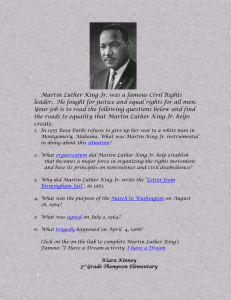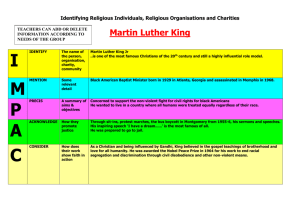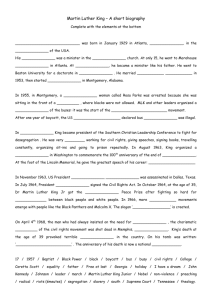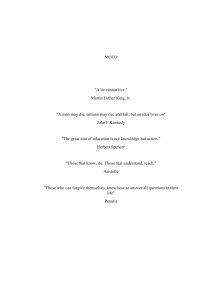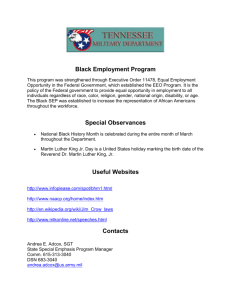Microsoft Word version
advertisement
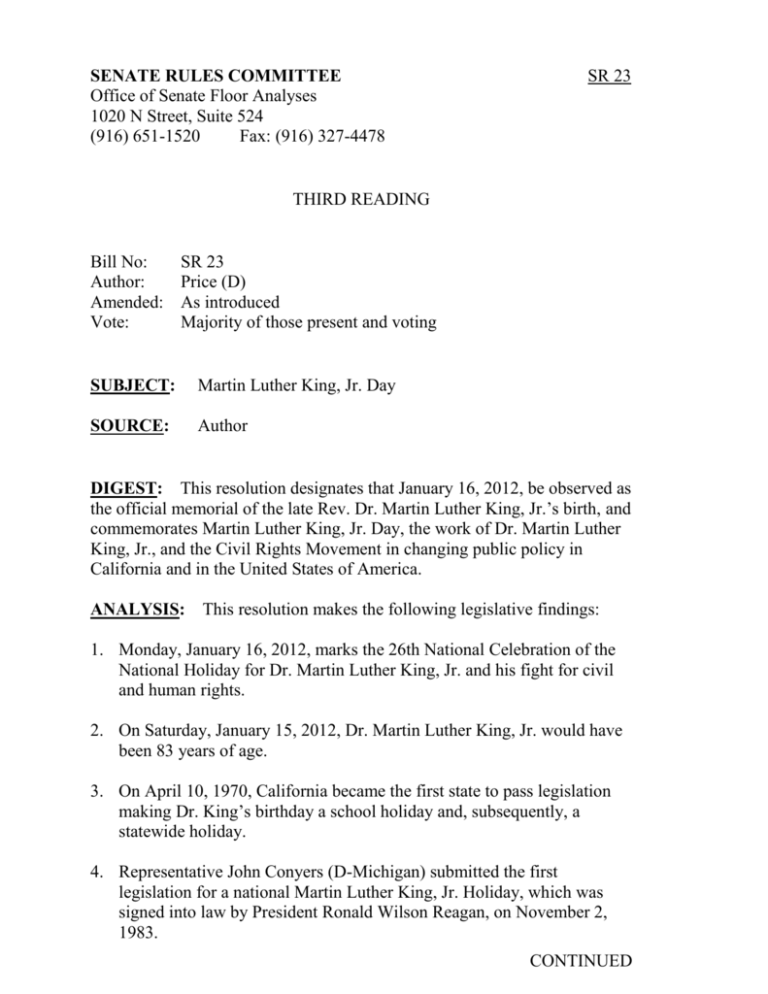
SENATE RULES COMMITTEE Office of Senate Floor Analyses 1020 N Street, Suite 524 (916) 651-1520 Fax: (916) 327-4478 SR 23 THIRD READING Bill No: Author: Amended: Vote: SR 23 Price (D) As introduced Majority of those present and voting SUBJECT: Martin Luther King, Jr. Day SOURCE: Author DIGEST: This resolution designates that January 16, 2012, be observed as the official memorial of the late Rev. Dr. Martin Luther King, Jr.’s birth, and commemorates Martin Luther King, Jr. Day, the work of Dr. Martin Luther King, Jr., and the Civil Rights Movement in changing public policy in California and in the United States of America. ANALYSIS: This resolution makes the following legislative findings: 1. Monday, January 16, 2012, marks the 26th National Celebration of the National Holiday for Dr. Martin Luther King, Jr. and his fight for civil and human rights. 2. On Saturday, January 15, 2012, Dr. Martin Luther King, Jr. would have been 83 years of age. 3. On April 10, 1970, California became the first state to pass legislation making Dr. King’s birthday a school holiday and, subsequently, a statewide holiday. 4. Representative John Conyers (D-Michigan) submitted the first legislation for a national Martin Luther King, Jr. Holiday, which was signed into law by President Ronald Wilson Reagan, on November 2, 1983. CONTINUED SR 23 Page 2 5. Dr. King and the Civil Rights Movement helped change public policy from segregation to integration, resulting in the repeal of the postReconstruction era state laws mandating racial segregation in the South known as the “Jim Crow Laws,” thereby leading to the passage of the Civil Rights Act of 1964, the Voting Rights Act of 1965, and other antidiscrimination laws aimed at ending economic, legal, and social segregation in America. 6. Dr. King and the Civil Rights Movement helped change public policy from legal and socially acceptable discrimination and segregation to an open and accessible policy of racial integration leading to equal participation and access to primary and higher education, housing, employment, transportation, federal, state, and local governmental elections, and other aspects of public policy relating to human rights. 7. These public policy changes at the national level influenced many changes in California that culminated in the passage of the Unruh Civil Rights Act and the Rumford Fair Housing Act, in open enrollment and access to higher education specifically with respect to the California State University and the University of California, and in employment and labor laws, transportation policy, election laws, and other aspects of public policy. 8. The unfinished business of Dr. King and the Civil Rights Movement was and is the plight of the poor, the fight against war and for worldwide peace, and the struggle for a fair, equitable, and sensible economic system. 9. Dr. King and the Civil Rights Movement noted that a majority of Americans lived below the poverty line, and that the huge income gaps between rich and poor called for “changes in the structure of our society”. 10. Dr. King, in the last months of his life, began organizing a Poor People’s Campaign to, among other things, assemble “a multiracial army of the poor that would descend on Washington--engaging in nonviolent civil disobedience at the Capitol, if need be--until Congress enacted a poor people’s bill of rights”. CONTINUED SR 23 Page 3 11. Dr. Martin Luther King, Jr. fought to change public policy from the “self-inflicted wound of segregation to the pluralistic diverse democracy” we continue to construct today. 12. Dr. Martin Luther King, Jr. and the Civil Rights Movement serve as a model for principled leadership and forward-thinking, bipartisan public policy. This resolution designates that January 16, 2012, be observed as the official memorial of the late Rev. Dr. Martin Luther King, Jr.’s birth, and commemorates Martin Luther King, Jr. Day, the work of Dr. Martin Luther King, Jr., and the Civil Rights Movement in changing public policy in California and in the United States of America. FISCAL EFFECT: Fiscal Com.: No JJA:do 1/13/12 Senate Floor Analyses SUPPORT/OPPOSITION: NONE RECEIVED **** END ****

